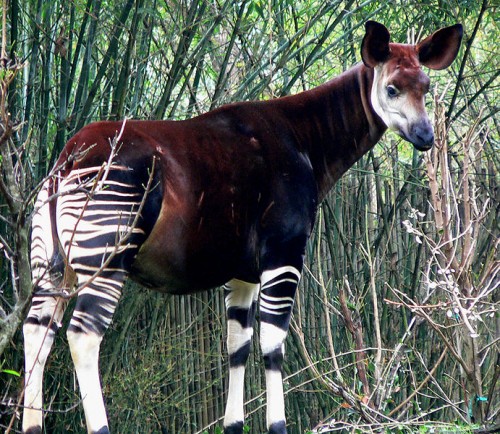
On June 24th, marauders armed with AK-47 rifles launched a vicious attack on the Okapi Wildlife Reserve Headquarters and Epulu Station in the Democratic Republic of the Congo (DRC), and murdered seven people.
13 captive okapi were also killed in the raid, including some who had been “wildlife ambassadors” for 23 years. Buildings were torched, computers and satellite phones were stolen, all food stores looted, and all medical supplies were stolen from Dispensary.
Over 30 hostages have been taken by the armed gang.
The deadly raid was carried out by a gang of ivory traffickers and illegal miners, who were seeking revenge on the Institute in the Congo for Conservation of Nature (ICCN) for their efforts to stop the gang’s illegal activities inside the Okapi Wildlife Reserve. Epulu Station was attacked in retaliation for ICCN rangers who had disrupted elephant killings and illegal mining activities in the Southern part of the Reserve.
John Lukas explained in an update on the Okapi Conservation Project website, that the armed assault was led by an ivory trafficker known as “Morgan”.
It has been verified that the attack led by Morgan was an act of revenge against ICCN for targeting his elephant poachers and illegal gold miners operating in the Reserve. The continent wide war on elephants, driven by escalating prices for ivory, provided Morgan with the funds to buy weapons and mount his attack on Epulu.
The Wildlife Conservation Network is collecting contributions for the emergency fund. You can make a contribution at www.wildnet.org/support — select “okapi” in the drop-down menu.
In addition, an emergency appeal has been launched by UNESCO and Fauna & Flora International to support the staff and rebuild the headquarters of the Okapi Wildlife Reserve, a World Heritage Site.
Guy Debonnet, of UNESCO’s World Heritage Centre, urges quick action.
Unless we can reverse this situation quickly, this will be a real setback for the conservation in Okapi Wildlife Reserve, home to the largest remaining population of forest elephants in the Democratic Republic of the Congo. We can’t let those poachers kill rangers and hunt wildlife with impunity.
A donation can be made via the Rapid Response Facility at www.justgiving.com/okapi.
At the time of writing, the Congolese Army and UN Troops continue to pursue the Mai Mai Simba rebels led by Morgan.
Ivory trafficking
Ivory trafficking is a grave concern across the African continent.
DRC is one of the ten COMIFAC nations which recently signed a groundbreaking agreement to cooperate across borders to combat ivory trafficking and illegal wildlife trade.
Last week, Gabon, another COMIFAC state, demonstrated its commitment to protecting elephants and other wildlife by incinerating over five tons of ivory comprised of 1,293 elephant tusks and 17,730 carved ivory trinkets.
Africa’s elephant crisis was the topic of a U.S. Senate Committee on Foreign Relations Hearing held in May 2012, at which Tom Cardamone from GFI testified that the illegal wildlife trade is connected to insurgent groups and global terrorism.
The main markets for ivory are China and Thailand, where domestic ivory trade loopholes make an ideal cover for illegally sourced ivory.
Image via Wikimedia Commons




